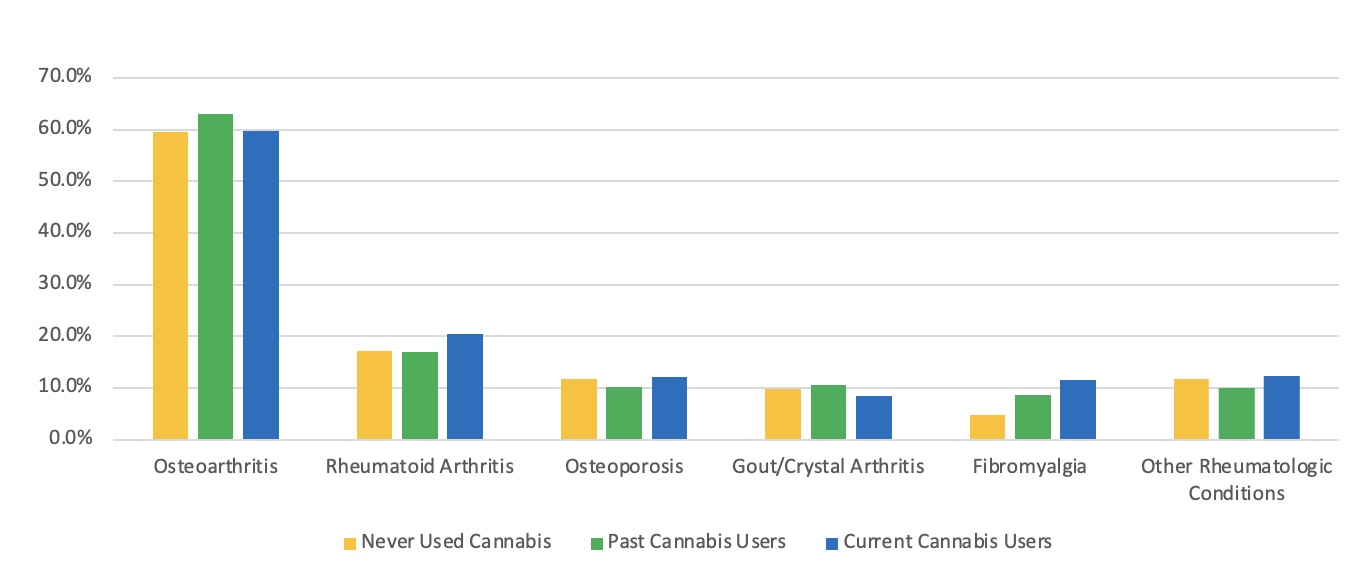Session Information
Session Type: Poster Session C
Session Time: 9:00AM-11:00AM
Background/Purpose:
Implications of using cannabis as therapeutics in a growing number of diseases coupled with increasing public awareness are leading to an increase in patient interest to use cannabis for the treatment of rheumatic conditions. Nevertheless, its legalization and widespread availability have made it difficult for providers to attain a true understanding of its current uptake and demand. Through this study, we aim to delineate the prevalence of cannabis use as well as identify the health profiles and correlates of cannabis use among patients with rheumatic disease in Alberta.
Methods: Adults in Alberta were contacted for recruitment through Alberta Health Services, the sole provincial-level administrative health authority, if they had one or more diagnostic code for rheumatologic conditions and at least one billing code related to health system use in the past year. Data were collected between March and November 2022 from participants using an online survey designed to capture a broad range of factors including sociodemographics, rheumatologic diagnoses and therapeutics, medical history and comorbidities, patterns of cannabis use, and lifestyle factors. Descriptive statistics were used to assess the prevalence and patterns of rheumatologic conditions and cannabis use among our sample. Logistic regression modelling was used to investigate the factors associated with cannabis use among respondents that had ever used cannabis.
Results: Our sample of 2,932 respondents consisted largely of female (54.1%, n=1,588), Caucasian (92.5%, n=2,711), and older (mean age=66.7 years, SD=12.2 years, range=18-98 years) respondents, with 730 (24.9%) current cannabis users, 851 (29.0%) past users, and 1,351 (46.1%) never users. The most prevalent rheumatic conditions among respondents were osteoarthritis (60.6%, n=1,776), rheumatoid arthritis (17.9%, n=526), and osteoporosis (11.4%, n=335), with 614 respondents (20.9%) reporting two rheumatologic conditions and 200 respondents (6.8%) reporting three or more conditions. 535 (18.2%) and 2,334 (79.6%) respondents experienced at least one mental and physical comorbid condition, respectively. Logistic regression model estimates indicate that individuals with increased odds of using cannabis were those who were younger, male, experienced mental illness, and sleep disturbances, reported high levels of pain, lacked health insurance, were previous or current smokers, and consumed four or more alcoholic drinks per week.
Conclusion: This study highlights rheumatology patients are using cannabis and identifies factors associated with its use. Our results provide foundational context for ongoing work focused on better understanding the role of cannabis use as a therapeutic tool for rheumatology patients. Future work includes the development and implementation of a tool designed to inform the use of cannabis in managing rheumatologic conditions.
To cite this abstract in AMA style:
Yacyshyn E, Gulati S, Lowe S, Jones A, Turk T, Yamamoto S, Gregg K, Kolewaski L, Olson J, Paul P, Sadowski C. Investigating the Health Profiles and the Prevalence and Correlates of Cannabis Use Among Patients Accessing Rheumatologic Care in Alberta, Canada [abstract]. Arthritis Rheumatol. 2023; 75 (suppl 9). https://acrabstracts.org/abstract/investigating-the-health-profiles-and-the-prevalence-and-correlates-of-cannabis-use-among-patients-accessing-rheumatologic-care-in-alberta-canada/. Accessed .« Back to ACR Convergence 2023
ACR Meeting Abstracts - https://acrabstracts.org/abstract/investigating-the-health-profiles-and-the-prevalence-and-correlates-of-cannabis-use-among-patients-accessing-rheumatologic-care-in-alberta-canada/

